Welcome to the week. It’s going to be a great! Let’s get started.
Here’s what our community has been talking about for the past seven days…
Move over, crime train: Joe Kent, a Republican candidate for U.S. Congress in southwest Washington opposes the project to replace the Interstate Bridge on grounds that it is an “Antifa superhighway” that would bring crime by Portland’s “drug addicts and criminals” into Vancouver. (The New York Times)
Perfect bike, Portland roots: Argonaut is now based in Bend, but Ben Farver started the company in Portland and it’s great to see him win high accolades for his carbon fiber bike in a major cycling publication. Congrats Ben! (Cycling News)
Bad company: Initial stats on pedestrian deaths nationwide reveal Oregon is not only not making progress to reduce them, we are on the wrong site of the death rate overall. (Ars Technica)
We must incentivize e-bike purchases!: When you acknowledge the full plate of benefits e-bikes offer our people and planet, it’s clear governments should do more to subsidize them (The Conversation)
Bike scouts: The idea of disaster relief by-bike is alive and well in the Philippines, where success using bikes after a major typhoon has evolved into official programs that lean into its community-building — as well as live-saving — potential. (South China Morning Post)
WTF NPS?: After 39 years of hosting the iconic Ride Around Mount Rainier in One Day (RAMROD), the National Park Service has said the event can no long use its roads, rendering it effectively dead. Organizers are scrambling to reverse the decision. (Seattle Bike Blog)
Babboe no: If you or someone you know rides a Babboe cargo bike, I have some very bad news: The frames can fail and the company knew and tried to cover it up. Woah. (Road.cc)
Say it ain’t so, Joe: A week after US DOT Sec. Pete Buttigieg promoted a massive freeway expansion boondoggle in our own backyard, national nonprofit T4 America dug into his boss’s signature achievement and called it a “climate time bomb” because it overwhelming funds new roads and expansions over transit and other, smarter investments. (The Guardian)
Parking in bike lanes can be deadly: San Diego County will pay $3 million to the family of a man who hit the back of a city-owned truck while on a bike ride. The truck was parked in a bike lane without any warning signage. (NBC San Diego)
Limiting car speeds: Get used to the phrase “intelligent speed assistance” (ISA) because it is slowly becoming more mainstream as the scourge of high speeds force action, and the tech has proven to work in functioning democracies like the ones they have in Europe. (Vox)
Thanks to everyone who sent in links this week. The Monday Roundup is a community effort, so please feel free to send us any great stories you come across.



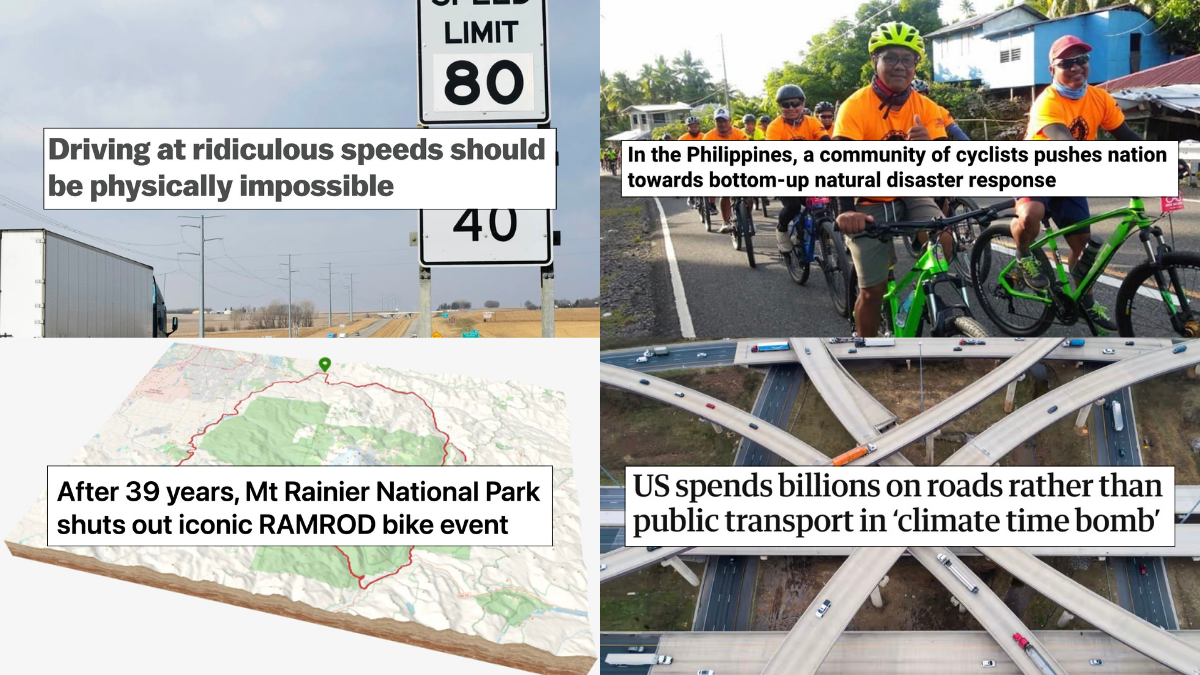
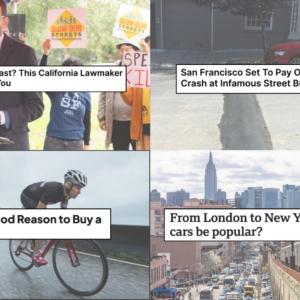
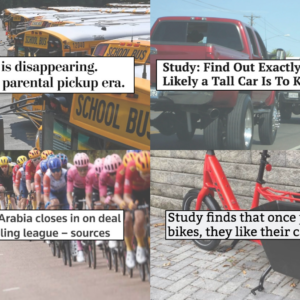
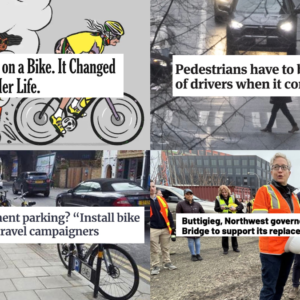
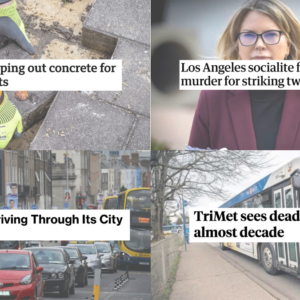
Thanks for reading.
BikePortland has served this community with independent community journalism since 2005. We rely on subscriptions from readers like you to survive. Your financial support is vital in keeping this valuable resource alive and well.
Please subscribe today to strengthen and expand our work.
re: antifa highway
One only needs to look at crime maps to see that crime clusters around actual car interstates and highways. This whole crime train thing is a myth. Criminals drive cars for the most part.
https://www.portlandmaps.com/detail/crime-society/168041_did/?p=R140656
This one shows a large cluster downtown with other crime along roads as you mentioned, but is that because they are driving or because that is more likely where businesses are located?
Most of the crime-roads have crime-bus lines on them.
Certain areas have higher crime because they’re straight-up sketchy, but usually areas have higher crime simply because more people go there/travel through, and thus the number of crimes rises. If the crime rate is 1%, then say 1 crime happens for every 100 people out in a big suburban neighborhood. Then go downtown where 10,000 people live, and 1% of that is 100 crimes. Some big cities may even have a lower rate of crime per capita, but all the media focuses on is the “high number of crimes downtown”.
So crime rates will likely be higher at places like downtowns, areas along busy roads, places around interstates, bus/train stations, etc. Airports are sort of an exception, but that’s due to the high level of security/police/govt presence. Private automobiles facilitate the movements of people in ways that trains can’t. So, anytime there’s a road, anything is possible along it.
I’ve been laughing about the Montucky Crime Train since I heard of that concept a decade ago. A train might bring a bunch of petty crimes (shoplifting, vagrancy, public intoxication/urination) adjacent to it’s stations, but when’s the last time someone robbed a bank and escaped by train?
I’m not sure what the answer to that is, but one thing that’s certain is that bank robbers gain a significant getaway time advantage if they use pre-loaded fare cards or monthly passes that allow them to board more quickly. It would be naive to think that this isn’t being discussed in Antifa’s Crime Planning subcommittee meetings or on their website.
I think making those types of fare cards illegal for bus trips over the Interstate Bridge is something Joe Kent may want to consider, at least for people under 35 or those wearing all black.
This would be especially effective for folks like Johnny Cash, who once shot a man in Reno just to watch him die.
The thing I love about the “crime train” thing is the idea that someone is gonna do a smash and grab, then stand and wait 15-30 minutes for a MAX train. Apparently criminals are incapable of driving.
Right? What a strange idea.
In regards to the Bike Scouts, it’s great to see the theory shown to be actualized so effectively and bicycles used as something that are undeniably not toys. It’s frustrating when I see articles or talk to people deriding the use of “toys” and how it takes “a real human (not the phrase usually used of course)” to operate a giant, ridiculous truck and they can’t wait for any apocalypse so they can drive said vehicle…….. somewhere. Those people are not only ignorant of history, but clearly lack real world life experience.
Bikes have been waging actual war since at least 1899 during the Second Boer War all the way through today because the bicycle is the best vehicle to get a person and some gear pretty much wherever they want to go.
3of7Project which is run by a prior Navy SEAL rates the bicycle as his go to bug out vehicle.
https://www.youtube.com/watch?v=eW6tbRQcEuI
Its fun to see the machismo that many truck afficionados prattle on about is non existent to people who actually do things in the world.
Also, the Japanese Army wouldn’t have captured Singapore without about 6000 bicycles,
https://www.welovecycling.com/wide/2019/06/28/japanese-style-bicycle-blitzkrieg/
and another link tracing the history of scout bicycles…
https://leedsbikes.com/bicycle-interests/military-bicycle-to-electric-bike-war-history/
Maybe going a bit off topic, but the Philippines scouts have really brought the abilities of bicycles (maybe not so much cargo bikes) to provide transportation and communication after a climate disaster into sharp relief. A great opportunity for Portland and the NW to wake up and get ahead of the oncoming hard times.
IF We must incentivize e-bike purchases, THEN We must incentivize normal bike purchases even moreso!
I don’t disagree – they should just be “bike subsidy” and could apply equally to either acoustic or electric bikes. However, I think the cost barrier for a regular bike is a lot lower. You could get a decent used commuter for zipping around town for $300-400. Regardless, I think the best way to incentive people to use bikes more is build more bike lanes.
While the cost barrier to all-mechanical bikes is much lower than that of ebikes, if it was just a “bike subsidy” as you propose, more people might opt for a more expensive, lightweight, easy to ride all-mechanical bike that’s even more sustainable than any ebike.
Also, according to my city’s sustainability committee’s benchmark report in 2016, my city has a poverty rate over 30%, so for many here, a $300-400 bike is out of reach. That’s the year others and I opened a bike shop, and my experience with customers makes me believe that figure. Also in my experience, those who buy the cheapest bikes, usually from Walmart, give up riding when they find repairing their bike costs more than buying another of the cheapest bike, especially if the bike failing caused them great distress when they really needed it to work.
By having a “bike subsidy”, such people could afford much more reliable bikes that fail less and overall cost less to operate per mile or hour, and as a result might be more likely to cycle in this world where most accept catastrophic and expensive automobile breakdowns as just a fact of life.
Much more regarding the idea of a “bike subsidy” sits in my mind, but I’m getting too tired to expound.
Bad Company: Apparently Hawaii is one of those cold northern states too cold to walk in, just like Washington state.
RE: Incentivize e-bike purchases
I think this quote from the article really sums up the whole topic best:
“Carless households tend to have lower income and lack mobility options. E-bike incentives can make travel more affordable and give people better access to jobs, health care, child care, shopping and other destinations. Such benefits likely far exceed any nominal greenhouse gas accounting from these transportation users.
E-bike purchase incentives are an investment in the broad benefits that e-bikes can provide. We believe they should be measured against the collective goals of the agency providing the incentives, whether its mission is transportation, equitable mobility, public health, economic development or environmental protection.”
E-bikes aren’t going to save us from catastrophic climate change and I’m skeptical about how much of a dent they’ll put into car dependence and use. I suspect when most low-income folks can afford a car, they’ll buy one.
But the other problem w. ebikes that doesn’t get talked about enough is the lack of infrastructure to support their use, even in a very bicycle friendly city like Portland.
For example, the grocery store trip, many of the stores I frequent have just a few bike parking spots that don’t provide enough space for more than a couple of bikes that are bigger than a conventional pedal bike, much less for e-cargo bikes.
There are approx. 500 apartments where I live. 250 of them are on the 2nd floor and only accessible by stairs. No one wants to carry a 50 lb. e-bike up & down stairs/.
Most low-income folks will be living an apartment and most of them will not be living in recently constructed one with elevators and bike rooms. Also, many of those buildings, I know, because I’ve a HUD voucher and looked into them, are intentionally built very close to good & frequent public transit options.
Folks should have options, but I suspect many of them would prefer a transportation wallet, rather than just and e-bike rebate.
Biketown could be a better resource in Portland if the bikes had better carrying capacity. Maybe they omitted rear racks to keep people from riding double but it would be really nice to be able to clip on some panniers.
Heartily agree. I think a lot of the concern about people affording e-bikes and having places to store them at home and having places to lock them safely while on errands can be overcome by a broad expansion of Biketown and by dropping the price considerably.
…
You know what, yeah! Very true. I’m in Antifa and I will absolutely do lots of Crime in Vancouver if they build a new bridge. All my Antifa comrades will too.
Jonathan, you are a prominent voice in local news, please use the Bike Portland megaphone to warn people of the dangers of going ahead with the IBR; hopefully we can stop this project before my fellow Antifas can do any damage.
Yes!!! I would “join” antifa, just so I could I could use the antifa highway to go to the ‘couve.
Famously, the heroic drivers of C-Tran’s 60 bus fight back the hordes of antifa crime-doers from breaking into the shining, utopian, crime-free Clark County.
RE Antifa Highway: The interesting question this raises for me is how much I hope bad people who will do good things for bad reasons get into power?
Good things for their own profit or good things for the citizens at large?.
In this case killing the CRC (oops, IBR) is good for citizens at large.
I’m sad about RAMROD. That’s a ride that I’d really like to do.
Joe Kent, a Republican candidate for U.S. Congress in southwest Washington opposes the project to replace the Interstate Bridge on grounds that it is an “Antifa superhighway” that would bring crime by Portland’s “drug addicts and criminals” into Vancouver. (The New York Times)
Now if Joe said he opposed having a bridge at all because of the criminals that would come from Portland… I would say that is rational thought, radical but rational. Not sure how a new bridge will change much.
Fairy tale ISA because cities can’t figure out how to slow traffic with better street design. What a failure.
Mr. Maus,
I’m surprised you have not highlighted how Hoboken, NJ (pop. 60,149), hometown of Ol’ Blue Eyes, just across the Hudson from New York City has not had a single traffic death recorded in the last seven years. A lot of it has to do with daylighting their streets.
https://www.governing.com/transportation/how-hoboken-has-gone-years-without-a-traffic-death
I just don’t like to repeat myself https://bikeportland.org/2023/04/26/hoboken-leader-shares-secret-sauce-for-vision-zero-success-373939
I am also not that into comparisons like this. I can appreciate Hoboken’s success, but it’s very unique in ways that make it much easier to save lives. There’s too much copy/paste excitement in urbanism circles these days. People need to appreciate their local situation more and realize it always comes down to local political/geographic/social issues etc..
Roger that and thanks for the thoughtful response. The daylighting problem in Portland is one of those things that never bothered me till I had kids, and I was just amazed such an urban place like Hoboken could just not have people needlessly die for the sake of parking convenience.
I’m late to the party, but I want to suggest that people take a broader view of Joe Kent’s remarks about the “crime train”. That kind of baloney serves two purposes. One is to distract everybody, on all sides, from anything like a productive discussion; the truth or falsehood of the statement is irrelevant for that.
The other, deeper purpose is to strengthen the position of corporations with respect to everybody else, with “everybody” as embodied in civil government. Keeping government, at any level, state, local, federal, whatever, from any positive accomplishment weakens government. It doesn’t matter whether a bridge, train, social program, etc. would benefit ordinary citizens; it’s more important to instill the idea that government is useless, and let corporations expand into the resulting power vacuum.
The walk-out by rightwing legislators here in Oregon is another example of the same principle. Preventing other people from getting any work done is absolutely a positive achievement from their point of view.
It is easy to get pulled into trying to refute rightwing baloney point by point — how many criminals ride the train, etc. — but I think it would be more productive to look at the bigger picture. At this point, I’m not quite sure what that will look like.